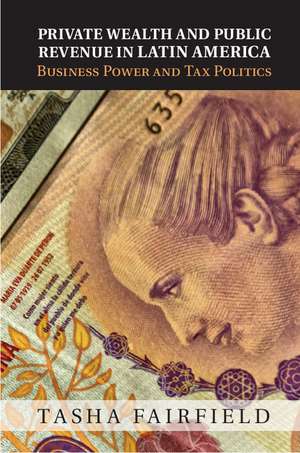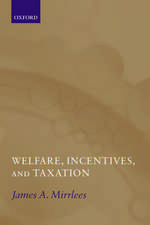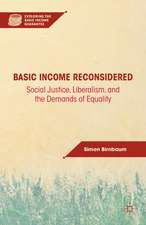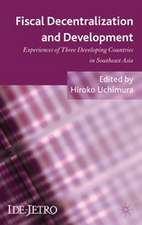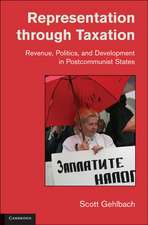Private Wealth and Public Revenue in Latin America: Business Power and Tax Politics
Autor Tasha Fairfielden Limba Engleză Hardback – 4 mar 2015
| Toate formatele și edițiile | Preț | Express |
|---|---|---|
| Paperback (1) | 322.51 lei 6-8 săpt. | |
| Cambridge University Press – feb 2017 | 322.51 lei 6-8 săpt. | |
| Hardback (1) | 758.35 lei 6-8 săpt. | |
| Cambridge University Press – 4 mar 2015 | 758.35 lei 6-8 săpt. |
Preț: 758.35 lei
Preț vechi: 881.80 lei
-14% Nou
Puncte Express: 1138
Preț estimativ în valută:
145.12€ • 155.17$ • 120.99£
145.12€ • 155.17$ • 120.99£
Carte tipărită la comandă
Livrare economică 17 aprilie-01 mai
Preluare comenzi: 021 569.72.76
Specificații
ISBN-13: 9781107088375
ISBN-10: 1107088372
Pagini: 364
Ilustrații: 27 b/w illus. 23 tables
Dimensiuni: 160 x 235 x 28 mm
Greutate: 0.7 kg
Editura: Cambridge University Press
Colecția Cambridge University Press
Locul publicării:New York, United States
ISBN-10: 1107088372
Pagini: 364
Ilustrații: 27 b/w illus. 23 tables
Dimensiuni: 160 x 235 x 28 mm
Greutate: 0.7 kg
Editura: Cambridge University Press
Colecția Cambridge University Press
Locul publicării:New York, United States
Cuprins
1. Tax policy and economic elites: going where the money is; 2. The power of economic elites; 3. Organized business and direct taxation in Chile: restricting the agenda; 4. Circumventing business power in Chile: progress at the margins; 5. Weak economic elites and direct tax policy successes in Argentina; 6. Sectoral tax politics in Argentina: finance; 7. Sectoral tax politics in Argentina: agriculture; 8. Bolivia's tax-policy tightrope: powerful elites and mobilized masses; 9. Tax developments under left rule in Bolivia and right rule in Chile; 10. Conclusions.
Recenzii
'Tasha Fairfield's impressive book revives and reconceptualizes crucial concepts of instrumental and structural power while also providing the definitive analysis of recent business politics in Chile, Argentina, and Bolivia. Fairfield's innovative theoretical framework shows how structural power interacts with other forms of business leverage and adroitly specifies how it operates even in shorter-term or narrower sectorial policies. This is a masterful combination of empirical research and theoretical development.' Ben Ross Schneider, Massachusetts Institute of Technology
'Despite long-standing concerns about economic inequality in Latin America and the growing attention to social policies that might address these concerns, there has been remarkably little political economy research on the tax side of these issues. Tasha Fairfield's new book, Private Wealth and Public Revenue in Latin America, takes an important step in filling this gap. Building on power resource theories, the book goes beyond the conventional focus on the impact of left parties and unions and shines a spotlight on the role and relative influence of business elites. The analysis combines a thorough theoretical discussion of the 'structural' and 'instrumental' power resources wielded by these elites with careful comparisons of tax policy politics in Chile, Argentina, and Bolivia. It is an excellent piece of scholarship on a badly neglected area of political economy research.' Robert Kaufman, Rutgers University, New Jersey
'With the predominance of institutionalism, political science has largely neglected economic forces. In her thoroughly researched analysis of tax policy in Latin America, Tasha Fairfield demonstrates the economic clout and political influence that private business can have and thus takes a major step toward filling this gap. By examining contemporary Argentina, Bolivia, and Chile, she also sheds important light on the opportunities and constraints that Latin America's 'new left' has for pursuing its redistributive initiatives.' Kurt Weyland, University of Texas, Austin
'Tasha Fairfield's conceptually ambitious and empirically rich study is a landmark contribution to literature on elites and Latin American political economy. Her thorough comparative analysis of Argentina, Bolivia, and Chile reveals that strong business associations tied closely to the state augment elite capacity to block progressive tax reforms. Conversely, social movement influence over the state can undermine elite capacity to resist taxation needed to redistribute wealth in a region long plagued by vast income disparities.' Eric Hershberg, American University, Washington DC
'Tasha Fairfield's book not only brings Latin American cases - among the most unequal in the world - into the conversation about the democratic politics of wealth, it is also the single best study to date of the causal channels through which Latin American economic elites shape tax policy and thus how democratic governance is distorted by the influence of the wealthy … The book deserves attention from scholars of taxation and other aspects of political economy and public policy, both in that region and far beyond.' Perspectives on Politics
'Extraordinary work.' Latin American Research Review
'Despite long-standing concerns about economic inequality in Latin America and the growing attention to social policies that might address these concerns, there has been remarkably little political economy research on the tax side of these issues. Tasha Fairfield's new book, Private Wealth and Public Revenue in Latin America, takes an important step in filling this gap. Building on power resource theories, the book goes beyond the conventional focus on the impact of left parties and unions and shines a spotlight on the role and relative influence of business elites. The analysis combines a thorough theoretical discussion of the 'structural' and 'instrumental' power resources wielded by these elites with careful comparisons of tax policy politics in Chile, Argentina, and Bolivia. It is an excellent piece of scholarship on a badly neglected area of political economy research.' Robert Kaufman, Rutgers University, New Jersey
'With the predominance of institutionalism, political science has largely neglected economic forces. In her thoroughly researched analysis of tax policy in Latin America, Tasha Fairfield demonstrates the economic clout and political influence that private business can have and thus takes a major step toward filling this gap. By examining contemporary Argentina, Bolivia, and Chile, she also sheds important light on the opportunities and constraints that Latin America's 'new left' has for pursuing its redistributive initiatives.' Kurt Weyland, University of Texas, Austin
'Tasha Fairfield's conceptually ambitious and empirically rich study is a landmark contribution to literature on elites and Latin American political economy. Her thorough comparative analysis of Argentina, Bolivia, and Chile reveals that strong business associations tied closely to the state augment elite capacity to block progressive tax reforms. Conversely, social movement influence over the state can undermine elite capacity to resist taxation needed to redistribute wealth in a region long plagued by vast income disparities.' Eric Hershberg, American University, Washington DC
'Tasha Fairfield's book not only brings Latin American cases - among the most unequal in the world - into the conversation about the democratic politics of wealth, it is also the single best study to date of the causal channels through which Latin American economic elites shape tax policy and thus how democratic governance is distorted by the influence of the wealthy … The book deserves attention from scholars of taxation and other aspects of political economy and public policy, both in that region and far beyond.' Perspectives on Politics
'Extraordinary work.' Latin American Research Review
Notă biografică
Descriere
This book identifies sources of power that help business and economic elites influence policy decisions.
